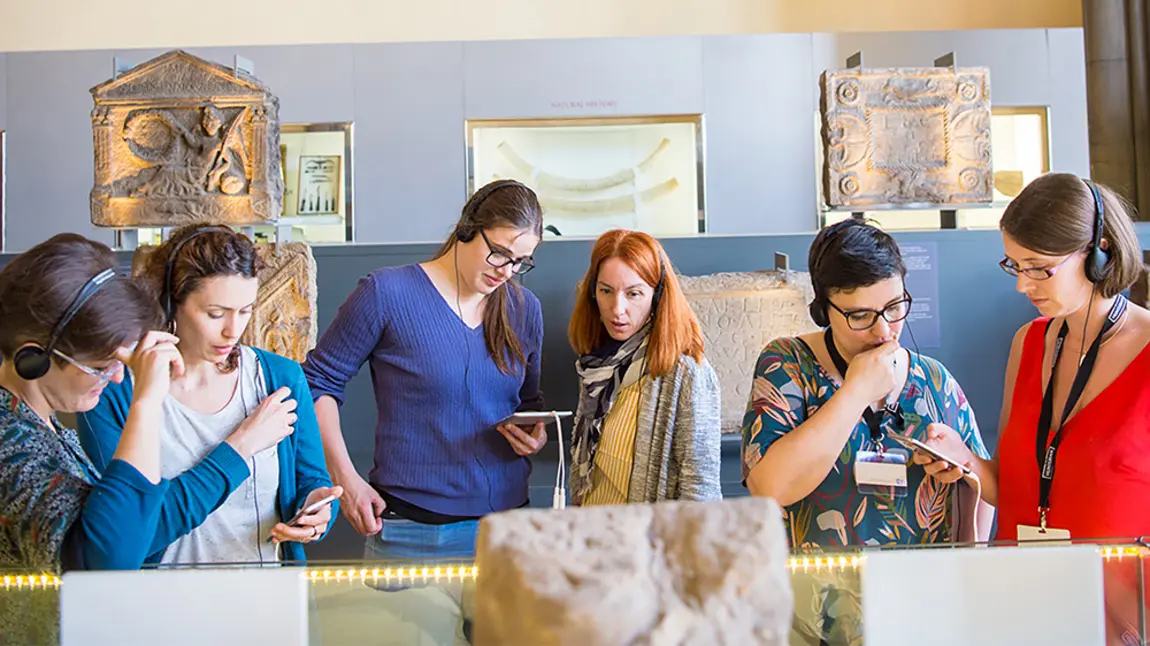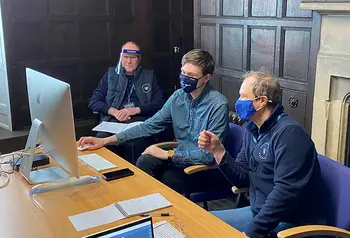Heritage leaders reveal their path to digital success

Updated: 10 September 2021.
From May 2020 the three leaders took part in Leading the Sector, a year-long professional development course in digital leadership funded through our Digital Skills for Heritage initiative.
It was run by digital and culture specialists Culture24 in partnership with Golant Innovation/The Audience Agency, with input from expert advisors including University of Leicester’s One by One initiative and Dr Nick Winterbotham.
Leaders from 14 medium to large UK heritage organisations completed the course – and had some fantastic results.
We learned a great deal about the challenges and opportunities of digitally literate leadership in the heritage sector.
- Anra Kennedy, Partnerships Director at Culture24
Anra Kennedy, Partnerships Director at Culture24, said: “We learned a great deal about the challenges and opportunities of digitally literate leadership in the heritage sector, especially the importance of mindset, by working with this cohort of senior leaders.
“We are delighted to be sharing some of their experiences and the thinking underpinning the course in a new 'Pathway' resource, which we hope will help many other heritage leaders and their staff get the most out of digital.”
New digital leadership resource
Culture24's new 'Pathway' resource is designed to help leaders take stock, reflect and develop their personal digital leadership and their organisation’s digital confidence and capacity. It helps leaders ask:
- What does ‘digital’ and 'digitally literate leadership' mean for my organisation?
- What kind of digital skills do my staff and volunteers have and need?
- How do I begin building my team's digital confidence and capacity?
- What role does digital culture play in leadership?
Start using the resource today to find out how you can move your organisation towards a more resilient, creative future using digital.
Meeting the leaders
The Pathway also included reflections from the leaders who took part in Leading the Sector. To tie in with its release, we spoke to three of the leaders to hear about their experiences.
They told us how and why they wanted to use digital in their organisations and what role their leadership played in supporting its take-up among staff and volunteers.
Providing the bigger picture
Katy Ashton, Director of the People’s History Museum, Manchester: I wanted to help the museum better understand the digital information we collect, and use this information to evaluate our impact and help guide our decision making. What quickly became clear was just how much data was available to us from across the museum. We built on what we were already collecting by identifying several new sources of data – including online ticket registration, giving and events.
We were able to visualise and share that information internally in useful ways – including for our Board of Trustees – to help celebrate success, understand our audiences and think about future programming, communications, fundraising, strategy and more.
You don’t need to have a specific digitally competency, as long as you can support those skills and abilities across the team.
- Katy Ashton
As a digitally literate leader, I discovered that my role in this was to create the conditions for the rest of the team to be more confident in collecting and interpreting the digital information. This meant asking good questions and providing space for people to experiment and test out ideas. It also meant keeping people focused on the bigger picture of why we were collecting the data.
I think heritage leaders might worry about needing to be experts – or at least be knowledgeable – about all aspects of digital work. But this isn’t my experience. You don’t need to have a specific digitally competency, as long as you can support those skills and abilities across the team.
Changing perceptions about digital
Christine Luxton, CEO of Suffolk Wildlife Trust: Leading the Sector helped me to see digital in terms of the organisational shift it can create, rather than as an ‘IT project’ or budget line for equipment, which it had previously been for us. Digital for Suffolk Wildlife Trust is about bringing the organisation together and removing the barriers and frustrations that staff and volunteers experience.
We have people working across Suffolk, often in quite rural locations. Our key ongoing transformations include improved internal communication and access to shared documents, common ways of working, greater confidence in our risk management processes and, through a move to web-based systems, increased resilience and flexibility. Staff can work from the office, from home or from a tractor cab!
The difference digital makes to how we work has become central to our thinking, and enabled us make the focus about our people and the nature we support.
- Christine Luxton
The difference digital makes to how we work has become central to our thinking, and enabled us make the focus about our people and the nature we support. Staff are excited and invested in digital now – they understand how it will help them day-to-day and are already spotting opportunities for the next step.
Leading the Sector also helped me to confidently ‘own’ digital and make it part of our culture and my leadership. At its most powerful, digital transformation needs to be a whole organisation approach. As CEO, I am uniquely placed to view the charity as a whole, and also to lead by example, embracing new ways of working and investing time in it.
Overcoming the unknown
Giovanna Vitelli, Head of Collections and Curatorial at The Hunterian Museum, Glasgow: Our challenge is to bridge the gap between understanding digital as ‘something else’ to recognising that it underpins much of our thinking and ways of working.
A key part of this was first understanding what digital actually means – particularly for the Hunterian. I asked our staff to complete a digital audit, which was based on a comparable version of The Heritage Fund’s Digital Attitudes and Skills for Heritage (DASH) survey. This provided a framework for understanding different digital areas, uncovered already existing digital skills within the museum and highlighted our gaps, providing useful benchmarks.
The survey fed into a greatly increasing digital consciousness level at the museum, which is enabling far more creative and confident ‘thinking out loud’ around what we ought to and can do. We feel more confident to take risks and trial new projects.
My leadership role is probably best described as normalising the digital aspect of our work and making us all aware of our potential to contribute.
- Giovanna Vitelli
My leadership role is probably best described as normalising the digital aspect of our work and making us all aware of our potential to contribute. This includes circulating information, articles, graphics etc that directly connect to some of the challenges we face. This has the extra benefit of connecting us to a larger movement that is facing similar challenges (particularly during the pandemic) – creating a ‘you are not alone’ feeling.
For me, knowing that this universe of similar folks existed has been game-changing. I have moved from caution and lack of understanding about what digital is, to a new confidence about promoting digital competence and literacy even as I myself am continuously learning from contacts in my sector.
My experience is paralleled by what the Hunterian is going through – overcoming fears of the unknown by building our digital understanding, step by step.
What advice would you give to other leaders?
Katy Ashton: Working alongside other leaders to discuss and explore digital was really valuable to me during Leading the Sector. I would encourage all leaders to reach out to peers and find ways to learn from each other.
Christine Luxton: You don’t need to be a technical expert! Focus on identifying your organisational needs and then allow the digital solutions to follow.
Giovanna Vitelli: Prepare the ground for experimentation and teamwork, and encourage colleagues to skill up, takes risks, share knowledge and work together without fear of being ‘less able’ in digital.
Digital Skills for Heritage
Our Digital Skills for Heritage initiative is designed to raise digital skills and confidence across the whole UK heritage sector. You can keep up to date with all our digital opportunities and guidance by:
- visiting the Digital Skills for Heritage webpage
- signing up to our newsletter and selecting the ‘digital’ preference
This story was updated on 10 September 2021 to include details of the new Pathway resource.







